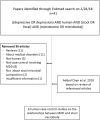Systematic Review of Gut Microbiota and Major Depression
- PMID: 30804820
- PMCID: PMC6378305
- DOI: 10.3389/fpsyt.2019.00034
Systematic Review of Gut Microbiota and Major Depression
Abstract
Background: Recently discovered relationships between the gastrointestinal microbiome and the brain have implications for psychiatric disorders, including major depressive disorder (MDD). Bacterial transplantation from MDD patients to rodents produces depression-like behaviors. In humans, case-control studies have examined the gut microbiome in healthy and affected individuals. We systematically reviewed existing studies comparing gut microbial composition in MDD and healthy volunteers. Methods: A PubMed literature search combined the terms "depression," "depressive disorder," "stool," "fecal," "gut," and "microbiome" to identify human case-control studies that investigated relationships between MDD and microbiota quantified from stool. We evaluated the resulting studies, focusing on bacterial taxa that were different between MDD and healthy controls. Results: Six eligible studies were found in which 50 taxa exhibited differences (p < 0.05) between patients with MDD and controls. Patient characteristics and methodologies varied widely between studies. Five phyla-Bacteroidetes, Firmicutes, Actinobacteria, Fusobacteria, and Protobacteria-were represented; however, divergent results occurred across studies for all phyla. The largest number of differentiating taxa were within phylum Firmicutes, in which nine families and 12 genera differentiated the diagnostic groups. The majority of these families and genera were found to be statistically different between the two groups in two identified studies. Family Lachnospiraceae differentiated the diagnostic groups in four studies (with an even split in directionality). Across all five phyla, nine genera were higher in MDD (Anaerostipes, Blautia, Clostridium, Klebsiella, Lachnospiraceae incertae sedis, Parabacteroides, Parasutterella, Phascolarctobacterium, and Streptococcus), six were lower (Bifidobacterium, Dialister, Escherichia/Shigella, Faecalibacterium, and Ruminococcus), and six were divergent (Alistipes, Bacteroides, Megamonas, Oscillibacter, Prevotella, and Roseburia). We highlight mechanisms and products of bacterial metabolism as they may relate to the etiology of depression. Conclusions: No consensus has emerged from existing human studies of depression and gut microbiome concerning which bacterial taxa are most relevant to depression. This may in part be due to differences in study design. Given that bacterial functions are conserved across taxonomic groups, we propose that studying microbial functioning may be more productive than a purely taxonomic approach to understanding the gut microbiome in depression.
Keywords: depression; gut; gut-brain axis; microbiome; microbiota.
Figures
References
-
- Gotlib IH, Hammen CL. Handbook of Depression. New York, NY: The Guilford Press; (2009).
-
- WHO Depression and Other Common Mental Disorders: Global Health Estimates. Geneva: World Health Organization; (2017). p. 1–24.
-
- WHO Depression Fact Sheet. WHO (2017).
-
- Lederberg J, McCray JE. “Ome sweet” omics: a genealogical treasury of words. TheScientist (2001) 15:8.
Grants and funding
LinkOut - more resources
Full Text Sources
Other Literature Sources


